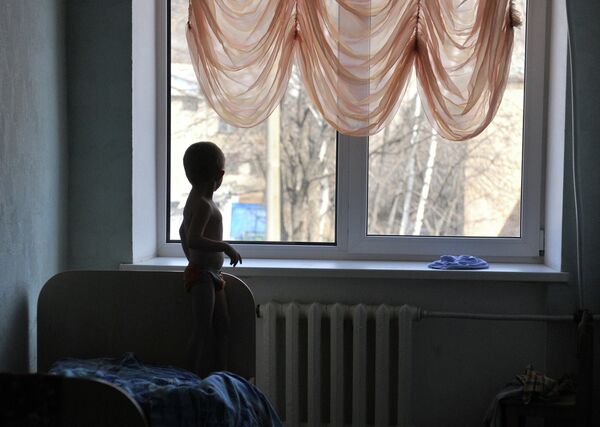MOSCOW, January 10 (RIA Novosti) – A Russian news website has provoked a furore after publishing what it claimed was an appeal from a Russian teenage orphan whose adoption by a US family was prevented by a new law banning adoptions by Americans.
The 1obl.ru news portal in the Chelyabinsk region published a story claiming a boy in a local orphanage, 14-year-old Maxim Kargapoltsev, had appealed to President Vladimir Putin and State Duma law-makers asking them to let an American family complete his adoption.
“I beg the State Duma and Vladimir Vladimirovich [Putin] to approve this adoption,” Chelyabinsk news site 1obl.ru quoted Kargapoltsev as writing in the letter on Wednesday.
The American couple was in the midst of the bureaucratic adoption process when President Putin signed a law on December 28 banning adoptions of Russian children by American citizens. The adoption ban, enacted on January 1, is part of Russia’s response to the US Magnitsky Act, which imposes sanctions against Russian officials accused of human rights abuses.
The adoption law, passed within days by both Russia's houses of parliament, stopped all pending US adoptions as well as future ones.
But officials dismissed the report as false and said Kargapoltsev did not write any letter.
“It’s not true. One news portal published that spoof story and it was copied all around without verification,” Denis Matsko, head of the orphanage where the the boy lives, told RIA Novosti on Thursday. “Maxim didn’t make any appeal either in oral or written form,” he said.
Matsko added that a news portal had offered to publish such a letter, but Maxim declined.
Putin's press spokesman Dmitry Peskov said on Thursday the Kremlin had not received any letter from the teenager.
Artyom Kholkin, a spokesman for the regional children’s ombudswoman, confirmed media reports saying Kargapoltsev had been in touch with his future US family for seven years already.
“It’s true that he was looking forward to going away and continuing his education there,” Kholkin told RIA Novosti.
Regional ombudswoman Margarita Pavlova told Komsomolskaya Pravda tabloid newspaper that the boy has an unspecified rare genetic disease that could be treated in the US.
“But in our country a kid suffering from the disease has almost no chances to find a family,” Pavlova said.
A spokeswoman for the 1obl.ru website refused to comment on the story when reached by phone on Thursday. The story was accompanied by a video clip Kargapoltsev reportedly filmed for his would-be adoptive parents, apparently showing New Year’s decorations in his orphanage. Both the story and the video had been removed from the site on Thursday afternoon.
Russia’s chief ombudsman Pavel Astakhov criticized the spoof as “a shameless speculation,” and said adoption was not the answer to the boy's medical problems.
“If there are some compassionate people who are ready to spend their money on a Russian kid’s operation, there is no problem about going there for a treatment. There is no need to adopt him for this,” Astakhov, well-known for his stance against foreign adoptions, wrote in his Twitter blog.
The American couple who wanted to adopt Kargapoltsev could not be reached for comment.
Yekaterina Lakhova, a Duma deputy with United Russia who co-authored the adoption ban, said no exceptions to the ban should be made, even if a child writes such an appeal.
“It’s clear that the boy could not do it [the letter] without adult help,” Lakhova said, adding it was likely more such media reports will emerge in the near future.
Figures from the US State Department show more than 60,000 Russian children have been adopted by American families in the last 20 years. Russian officials have repeatedly expressed concern about the safety of Russian children adopted in the United States, citing 19 cases in which Russian children have died at the hands of their adoptive American parents.
In 2011, according to official Russian figures, 89 of the children adopted by American families that year, or about 9 percent, were registered as having disabilities.
Russian officials said the new ban halted the adoption of 46 Russian children, while the US puts the number affected by the ban ranging from 500 to 1,000 at various stages of adoption.


